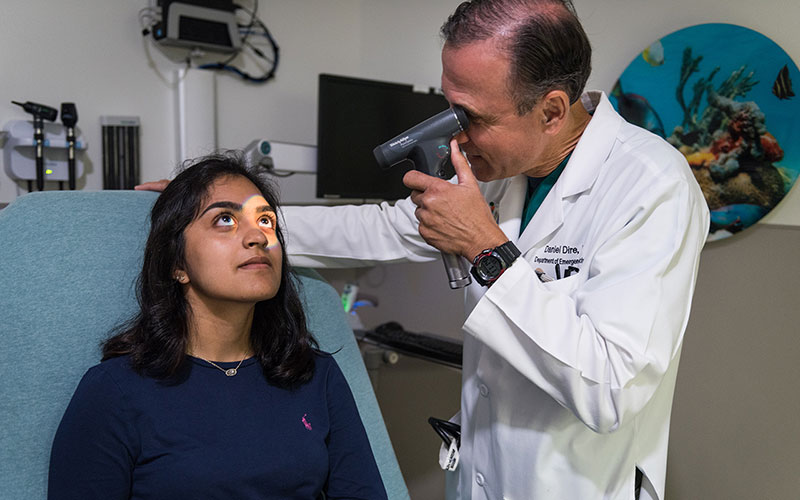Concussions have become a major concern in organized sports. According to one study, 14% of high school students and 18% of middle schoolers self-reported one or more sports or recreation-related concussions within the past year.
Whether it’s from football, soccer or lacrosse, the number of concussions in student athletes is on the rise. Learn the signs of concussion, which sports are associated with the most head injuries, and how you can protect your kids from concussions while playing sports.
What Is a Concussion?
Concussions are traumatic brain injuries caused by a blow or bump to the head or body, resulting in the brain moving back and forth rapidly in the skull.
Signs and Symptoms of Concussion
- Headache
- Appears dazed
- Vomiting or nausea
- Trouble thinking normally
- Memory problems
- Trouble walking
- Dizziness
- Vision problems
- Fatigue
- Mood changes
- Changes in sleep patterns
Depending on the severity of the concussion, symptoms may last as little as a few hours or up to several months. According to the American Academy of Pediatrics, up to 30% of children continue to experience symptoms for longer than a month.
Long-term Health Effects
Concussions can have long-term negative health effects including:
- Memory problems
- Sleep disturbances
- Emotional or mood changes
- Difficulty concentrating or completing tasks
How Dangerous Are Concussions in Youth Sports?
Most concussions in youth sports are mild and not cause for serious concern. But in some cases, especially when multiple concussions occur, the cumulative effect can include the loss of speech, the ability to walk and the ability to perform other normal functions. Additionally, children who have already had one concussion are more at risk of getting another.
Which Sports Have the Most Head Injuries?
10 Sports with Highest Concussion Rates
- Boys’ tackle football
- Girls’ soccer
- Boys’ lacrosse
- Boys’ ice hockey
- Boys’ wrestling
- Girls’ lacrosse
- Girls’ field hockey
- Girls’ basketball
- Boys’ soccer
- Girls’ softball
Source: Centers for Disease Control and Prevention
Cheerleading, rugby, volleyball and horseback riding can also cause head injuries.
Concussions in Girls’ Sports
Studies show that female athletes get more severe concussions, with some research indicating that girls are more susceptible to head injuries in sports than boys.
Girls are also more likely to report concussions than boys, though underreporting concussions is still prevalent regardless of sex.
How Adults Can Protect Kids From Concussions
Prevention Strategies
- Make sure your child has appropriately fitted equipment for their sport, including helmets.
- Ensure your child is using proper technique in their sports, especially contact sports such as tackle football.
- Make sure your child is developmentally ready for a sport.
- Never let your child play when injured.
Communication
- Talk to your kids about the seriousness of head injuries and the long-term impacts they could have.
- Stress the importance of having your kids tell an adult if they suspect they have injured themselves while playing a sport.
Medical Care
Seek immediate medical attention for your child if you suspect he or she has a concussion. Stop all physical activity and sports while waiting for them to be evaluated.
Managing Youth Sports Concussions
When your child needs help, we’re here for you. Depend on our pediatric specialists at the Women’s & Children’s Hospital in San Antonio. You can also take your child to our PediExpress walk-in clinic – no appointment needed.
If you are worried your child is experiencing a brain bleed or a more severe head injury, go to our brand-new, award-winning children’s emergency department. In the case your child needs trauma care, we can treat them at our Level I pediatric trauma center, the only one in South Texas.
Use the "Save My Spot" feature to save your spot in line at our PediExpress clinic. This is not an appointment




